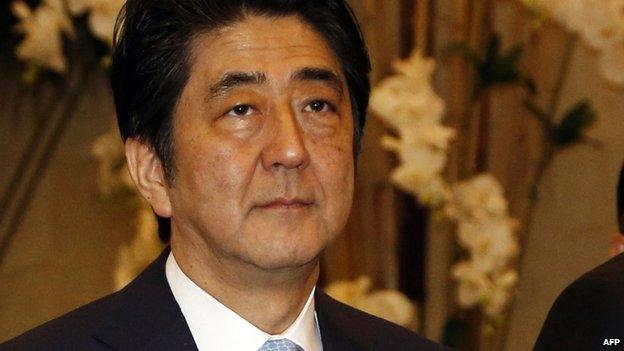Japan-China: PM Abe offers 'remorse' but no WW2 apology
- Published

Mr Abe's stance on World War Two is under close scrutiny this year - the 70th anniversary of the conflict's end
Japanese Prime Minister Shinzo Abe has expressed "deep remorse" over his country's actions during World War Two, stopping short of the fresh apology demanded by Japan's neighbours.
Mr Abe was speaking at a summit in Indonesia, where he also met Chinese leader Xi Jinping.
His speech included a warning against mighty nations using "unchecked force" - an apparent reference to China.
Mr Abe has been accused of playing down Japan's wartime atrocities.
China and South Korea say he has pursued a "revisionist" approach to history, placing a further strain on ties already weakened by territorial disputes and regional rivalry.
A Chinese foreign ministry spokesman, quoted by the Associated Press news agency on Tuesday, said Japan should "squarely face and reflect on the history of aggression" and "gain trust" from its neighbours.
Japan's military invaded much of eastern Asia during WW2
At the speech at the Asia-Africa summit in the Indonesian capital, Jakarta, Mr Abe said Japan felt "deep remorse over the past war" and promised to avoid aggression and settle international disputes peacefully.
The statement is unlikely to please China or South Korea, which have demanded a full apology from Japan over its military's conduct when it occupied their territory during the war.
Mr Abe's speech also warned against the "unchecked use of force by the mightier to twist the weaker around" - terms he has often used to describe China.
"The rule of law should protect the dignity of sovereign nations, be they large or small," he said, speaking after Mr Xi.
Mr Xi and Mr Abe met on the sidelines of the summit later on Wednesday, raising hopes of warming ties between the two nations.
The meeting, which lasted almost 30 minutes, was only the second time the two men have held talks. The first was after an awkward handshake at a summit in Beijing late last year.
Indonesian PM Joko Widodo was flanked by Mr Abe and Mr Xi at the summit photo-call
The Japanese leader's stance on WW2 is under close scrutiny this year, the 70th anniversary of the end of the conflict.
He has said he will uphold past apologies by Japan but also intends to make fresh remarks of his own - leading some to fear that he may revise previous acknowledgements of guilt.
Next week, Mr Abe is due visit the United States, where he will become the first Japanese leader to address a joint session of Congress.
He is also expected to pay his respects at a memorial to US soldiers killed during WW2 - many of them by Japanese forces.
The move will seek to soothe growing criticism that he has failed to face up to Japan's wartime past.
- Published23 April 2014
- Published14 March 2013